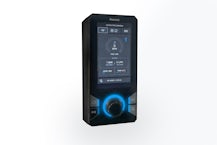- Products
The Power behind the World’s First All-Electric Van-pack Jetter

Since its launch in late 2019, Rioned’s all-electric van-pack jetter has been through an extensive trial period in The Netherlands. Last month the first eCityJet arrived in the UK with the company focused on demonstrating the capabilities of this innovative new machine to businesses in the UK drainage sector.
Whilst interest across the industry for low and zero-carbon equipment is growing, and tougher emissions regulations are accelerating this process, there remains some scepticism about the capability of battery-powered industrial equipment to handle the average daily workload.
To get a better view on this, it’s worth taking a closer look at the development of Lithium-Ionbatteries, the power source used in the eCityJet.

The Evolution of the Lithium-Ion (Li-ion) Battery
First released commercially in 1991 by the Sony Corporation, Lithium-Ion batteries are now widely used in portable electronic applications such as phones, laptops and power tools, and more recently electric vehicles (EV) and non-road mobile machinery.
Advances over recent years have made it possible to make the battery size smaller and lighter whilst still offering higher energy densities than alternatives such as lead-acid or nickel-metal hydride batteries. With a longer charge retention, li-ion is also more stable than other battery types and can be recharged many hundreds of times over without losing any capacity.
It is predicted that the global EV market will reach 100 million by 2028, with developments moving towards lithium-silicon and solid-state batteries that will further improve performance, hold more energy, and last longer at a lower cost.
For non-road mobile machinery, such as jetters, electrification and hybridisation of powertrains is considered one of the most promising methods for reducing energy consumption and carbon emissions. What’s clear is that these types of machines will become ever-more prevalent as low and zero-emission zones are expanded across international cities.
Developing the eCityJet
Rioned’sHead of New Product Development, Marc Soethout, explains that choosing the power source for the world’s first all-electric van-pack jetter was a big challenge: “Many of the technical solutions we came up with were just not able to meet our standards. The highest capacity was required for the new power unit, while the battery installation needed to be as compact and lightweight as possible.”
Rioned turned to MG Energy Systems, a specialist energy storage manufacturer based in The Netherlands. Their solution was to use an array of six high-density li-ion batteries mounted on a rack-system at the rear of the jetter. The array has a capacity of 30 kWh, ample power to drive the jetter pump, and includes a central monitoring and control system, LCD energy monitor and a charger unit.
Important in the specification was the use of MG’s lightweight HE200 li-ion battery, which has one of the highest available energy densities on the market at 175 Wh/kg. Overall, the total weight of the six-unit battery bank is only 172kg, meaning the fully equipped eCityJet is only marginally heavier than a conventional diesel van-pack, weighing in at approximately 600kg.
“Of course, we did set the bar high for ourselves,” says Marc Soethout. “But by remaining critical and not making any concessions we have succeeded in creating this innovative product.”
Advantages of Battery-powered Jetting
The eCityjet has all the features of a conventional jetter but produces zero-emissions. Battery operation also massively reduces operational noise, making it ideal for urban areas where restrictions may be in effect.
Throughout 2020 the eCityJet has been put through extensive trials in The Netherlands, with Van der Velden Sewage Management was one of the first drainage contractors to test the new machine. Celestino da Cruz, a sewer technician with the company, says the results of the test were extremely positive.
"The first revelation was the capacity of the batteries,” he explains. “In practice, they were better than expected. We were able to work with it for two full days (about 10 unclogging and cleaning jobs) without having to recharge.”
“On the first day, there were five jobs. In total, about 450 meters of pipe were cleaned (mainly 125 mm diameter). We started at 92% battery charge and ended the working day with 56% on the counter. The batteries were not charged until the end of the second working day when they were almost empty.”
"It was great to work with a machine that does not produce as much noise as other sewer cleaning machines, whilst it is just as powerful and easy to operate. If you ask me, this is the future of sewer cleaning.”
See the eCityJet in Action
Rioned UK will be arranging demonstrations of the eCityJet over the next few months and Mark Cox, Sales Manager at Rioned UK is excited to show off its capabilities: “The drainage equipment sector is changing and machines using alternative power sources are set to become the norm over the next decade. We’re proud to be at the forefront of this change and I’m looking forward to showing customers what the eCityJet can do.”
View Our eCityJet Here
Visit MG Energy Systems Here
For more information and to book a demonstration, please contact Mark Cox on 07595 275870 or email [email protected]
- Products






